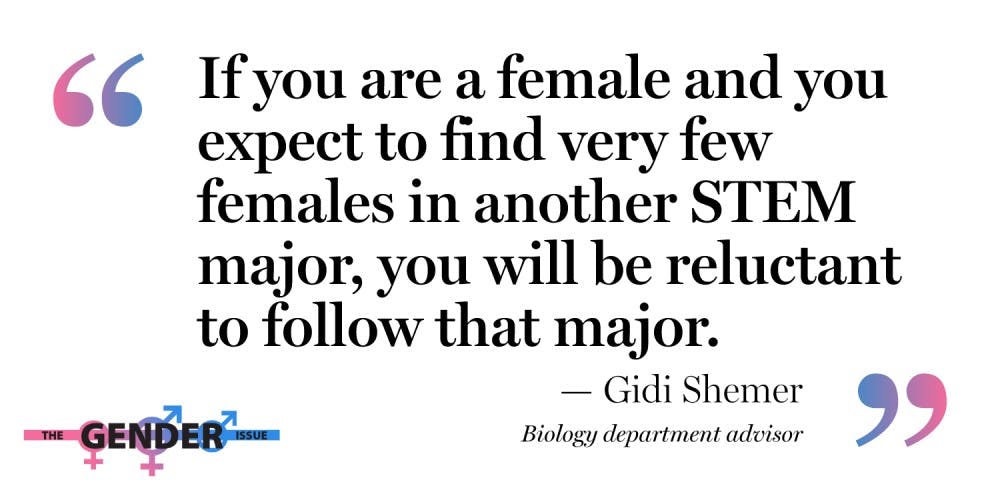When they leave UNC
In the larger lecture classes for the major, many of the courses are equally split between men and women, Dent says.
Dent said she notices an increased competition in her biology course, but not because of the gendered aspects of it — rather because of the sharp learning curves on assignments.
But it's once students leave undergrad where the ingrained gender disparity begins.
"At the college level, it is more majority (women), but the more you go in your career, the research field will still be perceived as a male-dominated career," Shemer said. "It is becoming much better, but we are far away from saying it is equal."
Shemer said he hears few concerns from biology students about this, but many of the students are pre-medical or pre-dental students who plan to go into healthcare over research.
Growing up, Dent was always told, "Oh, you're smart, you should be a teacher."
"A lot of women are pushed into that kind of role," she said. "Is that just because no one else will do it and women feel that pressure to pick up the slack that no one is doing? Or is because they're seen as more caretakers and not scientists?"
Junior biology major Ace Lane said she saw this early. Although she says the attraction to human medicine is unavoidable for many biology students, she feels women have to go the extra mile to fight that track when they think it's not for them.
"I think a lot of women, when they're interested in science, their parents always voice to them, 'OK, you can be a doctor' because I think that's pretty much non-gendered than any other place you can go in science," she said.
To get the day's news and headlines in your inbox each morning, sign up for our email newsletters.
Encountering generational dilemmas
Shemer says the only gendered issues he sees students coming to him about are the few between female students and their professors.
"Professors will not be aware enough," he said. "It could be the issue of gender, just not being aware enough of simple things. I even personally still need to tell myself about the he said, she said versus the they said."
Lane said she hasn't encountered any problems with professors, but she's heard of a few women STEM majors who have faced problems with professors having different expectations between men and women — although she hasn't experienced it in the biology department.
"I've heard of so many girls who have experienced that — that they feel like a 'less than' in the class and assume to know less or assume to not do their homework, but mostly in a lot of 'hard sciences,'" she said.
Senior biology major Kelly Duffy said her experience in the biology department has been relatively inclusive.
"People say some dumb things just in the world like 'you're too pretty to be a scientist,'" she said. "But I don't think I've ever gotten that from anyone in the bio department."
In the lab
Although Dent has not experienced the problems Shemer describes, she has seen gender disparities play out in her internships.
Like when she was at Duke Energy in summer 2015. Dent recalls one regional meeting with branches of the company from three different states where out of the about 30 to 40 people in the room, only three were women. Of the three, only two women scientists were there.
"It was interesting because a lot of them were middle-aged men who have been working there all their life, but it kind of seemed like they weren't bringing in new people yet," Dent said. "And I talked to her and I asked, 'Are women just not apply for these positions?' and she totally shied away from the conversation."
The problems even carried into workplace fashion choices. When Lane worked at NASA in high school, she said she would feel the judgment whenever she wore a long skirt or any sort of feminine clothing to the lab.
"I feel like in the research workspace, especially at NASA, if you, for example, presented as more feminine, it was commonly conceived that you were not working in the laboratory, you weren't a scientist — you were a secretary or a developer," she said.
Duffy said she sees biology as the more accepting of any STEM field, whether in undergrad or in the research field.
"It's really interesting, I do think that the women here do tend to be more pre-health than pre-research," she said. "But even at the research level, when you've weeded out all of the pre-health, women do seem to be more interested in biology, and it's because it's a more generally welcoming field."
@samsabin923
special.projects@dailytarheel.com





